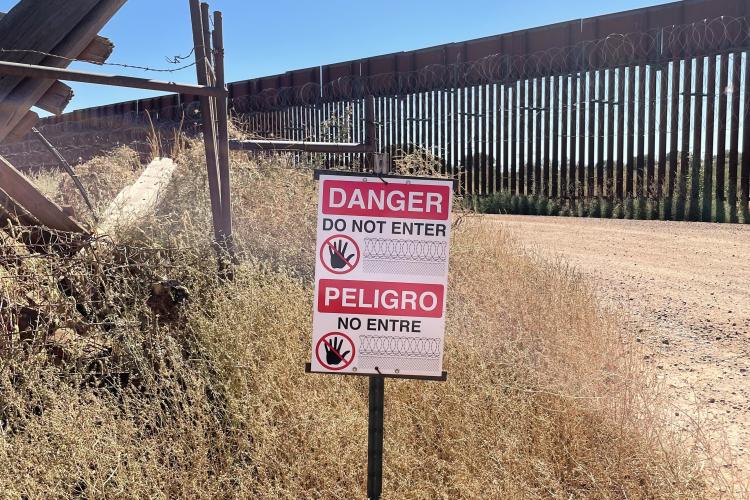Challenging the Borders of Difference and Inequality: The Power of Place, Processes, and People
Posted:
Time to read:
Guest post by Nancy A. Wonders and Lynn C. Jones, Professors in the Department of Criminology and Criminal Justice at Northern Arizona University. Dr. Wonders has published extensively on the criminology of borders and mobility; the relationship between social inequality, difference, and justice; and the development of effective strategies to create just and sustainable communities. Dr. Jones’ research and publications focus on gender, victimization, and justice policy, with particular emphasis on those most vulnerable in society, as well as cause lawyers, social movements, and social change.
This is the final post from our new themed series focusing on selected chapters from the newly published Handbook of Migration and Global Justice, edited by Leanne Weber and Claudia Tazreiter and published by Edward Elgar. The editors’ complete introduction to the handbook is available as an open access download here.

Migration is a long, durable, and colorful thread in the fabric of human history, but today many nation-states are framing migration as a “crisis,” justifying restrictions on the mobility of border crossers that limit access to rights and heighten social exclusion. As described in Crimmigrant Nations, crisis frames tend to characterize migrants as a threat which has increased hostility toward border crossers and facilitated a resurgence of nationalism. Crisis frames reflect – and produce – mobility hierarchies that ensure that some people and parts of the world continue to be privileged over others.
Our work contributes to an alternative framing of migration that centers the perspectives of those who cross borders and reconceptualizes migration as a social movement for global justice. Through their mobility, migrants challenge the view that mobility is a luxury good available only to the already privileged and reveal borders as sites of political struggle. Border crossing and irregular entry can be understood as embodied forms of individual and collective resistance against the exclusive right of nation-states to define membership and rights. Reframing migration as a social movement demands that we consider those who cross borders not as “migrants” but in their full humanity - as family members, workers, community members, agents of social change, and activists for global justice.
If we are to challenge the social production of “irregularity” and exclusion by nation-states, it is important to identify strategies that affirmatively produce meaningful economic, political, and social inclusion. While it remains important to pressure nation-states to do more to protect border crossers, we must remember that throughout history, rights and equality have rarely been granted by nation-states without significant political struggle. Therefore, it is essential to consider sources of power that can be wielded by ordinary people who seek to challenge hierarchies of mobility and rights and heighten global justice from below. In our contribution to the Handbook on Migration and Global Justice, we focus on three sources of power that are revealed by contemporary migrant struggles.
Power of place
Cities and local communities have become crucial sites for challenging the social exclusion associated with national border policies. Cities are not simply reactive to the changing character of the ‘national’; they are initiators of inclusive policies. For example, the development of “sanctuary city” and “cities of refuge” designations amplify and forge political unity between migrants and allies by drawing on the strength of existing organizations, reflecting collective action, and creating an aesthetic of citizenship that transforms the borders of our imagination about migrants as rights-worthy and “like us.” Other places have become “human rights cities” by ratifying and enforcing human rights treaties. Such expressions of local-level power challenge repressive national migration policies by unsettling the exclusive power of the nation state over the meaning and allocation of rights. Cities and communities around the world have the potential to create more welcoming places for border crossers by sharing tactics and strategies that foster inclusion.

Power of processes
In The Politics of Operations, Mezzadra and Neilson argue that neoliberalism has generated processes and dynamics that contribute to significant global inequality, but which exceed the power of nation-states. Thus, focusing on the attainment of formal legal status and rights is increasingly insufficient for resolving the vulnerability faced by migrants given that citizens in many nations are also experiencing ever more precarious existences. The pursuit of global justice requires confronting the processes that produce precarity and, importantly, developing alternative economic processes that improve the quality of life for all. For instance, to mitigate the harm associated with exploitative labor practices, some regional governments and localities have moved to create stronger protections for workers, regardless of legal status, such as minimum wage floors and protections against wage theft. Policies that target exploitive processes that affect all workers can be helpful for revealing the common plight faced by migrants and those with citizenship. Alternative processes capable of meeting basic needs outside of neoliberal capitalism are also important strategies for challenging the profound privatization of public goods that has occurred under neoliberal capitalism. “Commoning” and the validation of economic relations of cooperation and sharing can destabilize the power of the formal neoliberal marketplace and can facilitate the provision of housing, childcare, and other goods essential to daily life and social inclusion.
Power of people
The pursuit of global justice requires mobilizing people power and forging greater unity and political engagement between border crossers and potential allies. Migrants and allies engage in many different types of border activism in an effort to foster social change, from influencing local city councils and politicians to the use of protests and civil disobedience. Migrant rights organizations play a crucial role in fostering justice for border crossers, both at the local level and through global networking. For ‘irregular’ migrants and other marginalized groups, safety and security have rarely been provided by formal institutions of social control, a reality that has recently received heightened attention due to the global Black Lives Matter movement. Instead, safety and security are created when trusted people and communities are empowered to care for and protect one another. Research on migrants’ lived experiences has shed light on the many ways that safety, security, and a sense of belonging can be facilitated by education and health care workers, employers, and many others. By building bridges between those along the citizen-irregularity divide, the socially constructed character of hierarchies of mobility rights is made visible.
Global justice is not an outcome, it is a process through which people are able to gain and exercise power over the quality and character of their lives. Power can be found in the places of everyday life, by challenging processes and dynamics that produce precarity and vulnerability, and by building multi-scalar bridges between migrants and allies, at the local and global scales. Migration is one of the oldest and strongest threads binding humanity together; collectively, we have the power to weave the diverse strands of contemporary migrant experience into a vibrant tapestry of global justice for all.
Any comments about this post? Get in touch with us! Send us an email, or post a comment here or on Facebook. You can also tweet us.
__________
How to cite this blog post (Harvard style)
Wonders, N. A. and Jones, L. C. (2021). Challenging the Borders of Difference and Inequality: The Power of Place, Processes, and People. Available at: https://www.law.ox.ac.uk/research-subject-groups/centre-criminology/centreborder-criminologies/blog/2021/12/challenging [date]
Share:








